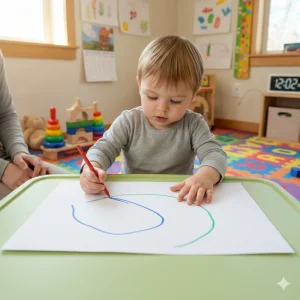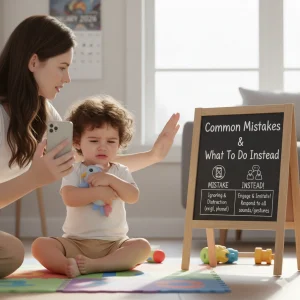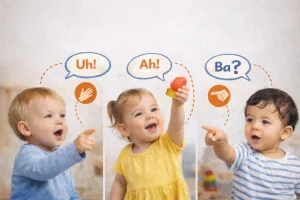Storytelling and Language Delay in Preschoolers: A Parent’s Guide
By Rajini D
Last Updated: October 14, 2025
Every parent loves hearing their preschooler share little stories about their day—whether it’s what happened at circle time or a funny game at the playground. But what if your child struggles to put events in order, leaves out key details, or avoids storytelling altogether? These challenges can feel worrying, especially when you notice other children chatting easily.
Storytelling is more than just a fun skill—it’s a major milestone in language development for preschoolers. When children can’t retell a story with a beginning, middle, and end, it may point to a language delay. In this article, we’ll explore the signs of expressive and receptive language delay, why storytelling feels hard for some preschoolers, and simple ways you can support your child at home while knowing when to seek professional help.
Free Speech Help for Kids
Concerned about speech delays? Book a free consultation with our expert speech therapist and get guidance tailored to your child’s needs.
What is Narrative Language and Why It Matters?
Narrative language is the ability to tell or retell a story in a clear, organized way. At its simplest, it means putting thoughts into a sequence—beginning, middle, and end—so that others can understand what happened. For a preschooler, this could be as small as explaining, “I went to the park, I saw a dog, the dog ran fast.” These early storytelling skills in preschool are stepping stones to bigger communication milestones.
Why does this matter? Narrative language does much more than help children talk about their day. It strengthens reading skills by teaching them to recognize story structure in books. It also supports social communication, since sharing stories helps children connect with friends, teachers, and family members. On top of that, organizing ideas into a sequence boosts cognitive development, improving memory, problem-solving, and logical thinking.
When a child struggles with sequencing skills in preschool, they may leave out important details, mix up the order of events, or avoid storytelling altogether. Recognizing these signs early helps parents and teachers know when extra support—or even professional guidance—might be needed.
Signs of Language Delay in Preschoolers
Every child develops at their own pace, but there are certain red flags for language delay that parents and teachers should watch for. Preschoolers are expected to use words, sentences, and stories to share ideas, connect with others, and understand the world around them. When a child consistently struggles in these areas, it may point to a language delay. Below are three key areas where difficulties often appear.
Expressive Language Delay
An expressive language delay in preschool means a child has trouble putting thoughts into words. They may use only a limited vocabulary, rely heavily on gestures, or speak in very short phrases when longer sentences are expected. These children often struggle to answer simple WH-questions like “What happened?” or “Where are we going?”. As a result, their speech may sound incomplete, leaving parents and teachers guessing what they really mean.
Receptive Language Delay
A receptive language delay in preschool happens when a child finds it hard to understand what others are saying. They might not follow multi-step directions like “Go to your room, get your shoes, and bring them here.” They may also have trouble answering questions correctly or understanding the sequence of a story retell. These challenges can affect classroom learning, social play, and even daily routines at home.
Storytelling Red Flags
Storytelling is a powerful window into a child’s language skills. Some clear red flags for language delay include:
- Your preschooler avoids pretend play or role-playing games.
- They cannot retell daily events in order, often skipping important steps.
- Their stories lack a clear beginning–middle–end structure, making it hard for others to follow along.
These difficulties may seem small at first, but they can impact later reading comprehension, writing skills, and social communication. Spotting them early helps parents take the right steps to support their child.
Why Storytelling Feels Hard for Your Child
It’s natural for parents to wonder, “Why my 4-year-old can’t tell a story the way other kids do?” The truth is, storytelling is a complex skill that develops gradually between ages 3 and 5. At this stage, children are expected to talk about simple events in order—like what happened at snack time or during a playdate—and begin adding details that make their stories easier to follow.
For some children, however, this doesn’t come easily. Narrative difficulties in children often show up in three common ways:
- Sequencing problems – mixing up the order of events or skipping important steps.
- Cohesion issues – leaving out words like first, then, finally that connect ideas.
- Limited vocabulary – struggling to find the right words, making stories short or unclear.
It’s also important to distinguish between children who are simply “late talkers” and those who may have a preschool language disorder. Late talkers often catch up with exposure, practice, and time, whereas children with developmental language disorder (DLD) continue to face challenges in forming complete stories, answering questions, and engaging in conversations even as they grow older.
Understanding these differences helps parents know whether their child just needs extra support at home or could benefit from professional guidance. Early recognition makes a big difference in boosting confidence, language growth, and school readiness.
How to Support Storytelling at Home
Supporting your child’s storytelling doesn’t have to feel like a lesson—it can be woven into everyday routines in fun, engaging ways. Simple storytelling activities for language delay can strengthen vocabulary, sequencing, and confidence, giving your preschooler the tools to share their thoughts more clearly. Here are three strategies parents can use at home.
Use Picture Books and Story Maps
Picture books are powerful tools for building narrative skills. When reading together, pause and ask your child, “What happened first? What came next?” Using a simple story map or graphic organizer can help them see the structure—beginning, middle, and end. Encourage them to use words like first, then, finally to connect ideas. These visual supports give children a clear roadmap for organizing their stories.
Practice Daily Retells
Daily conversations are perfect for practicing storytelling. At dinner or bedtime, ask your child, “Tell me what happened at preschool today.” As they share, gently add temporal words and connectives like then, after that, or finally. Over time, this builds stronger sequencing and helps with building vocabulary for storytelling at home. Even short retells of daily routines—like getting ready for school—can make a big difference.
Play-Based Storytelling
Children learn best through play, and play-based storytelling ideas make language practice feel natural. Pretend play with dolls, action figures, or stuffed animals can spark simple narratives. Role-playing everyday scenarios—like a trip to the doctor or grocery store—gives them a chance to practice dialogue and sequencing. Puppet shows are another playful way to encourage imagination while reinforcing story structure.
With consistency, these strategies can transform storytelling from a struggle into an exciting way for your child to express themselves.
When to Seek Professional Help
While every child develops at their own pace, there are times when extra support is needed. If your preschooler consistently struggles to tell simple stories, avoids answering questions, or becomes frustrated when trying to explain what happened during the day, it may be time to seek guidance from a professional. These are clear signs it could help to consult a speech-language pathologist (SLP).
Speech therapy for preschoolers goes far beyond practicing sounds—it builds the foundation for storytelling and communication. An SLP uses play-based strategies, books, and structured activities to teach children how to organize thoughts, expand vocabulary, and add important sequencing words like first, then, next, finally. Over time, children learn to create stories with a clear beginning, middle, and end.
In many cases, schools and early intervention programs also create IEP goals for narrative language. These Individualized Education Program goals outline specific skills—such as retelling a short story with two or more events, answering WH-questions about a story, or sequencing three steps from a picture card. With structured support, children not only improve storytelling but also strengthen their confidence, social interactions, and readiness for reading and writing.
Narrative language intervention activities in preschool can make a powerful difference, especially when combined with practice at home. The earlier a child receives help, the easier it becomes for them to catch up with peers and enjoy sharing their ideas through stories.
Conclusion
Some struggles with storytelling are normal for preschoolers, but if your child often finds it hard to explain events, retell simple stories, or use words to share ideas, it may be a sign of language delay. The good news is that children can improve quickly with early support. Speech therapy for preschoolers helps build vocabulary, sequencing, and confidence in storytelling. Parents can also use fun language-building activities at home to support progress. If you’re concerned, consult a speech-language pathologist (SLP) today. Early help makes communication easier, learning smoother, and storytelling an enjoyable skill for your child.
Frequently Asked Questions:
1. What are the early signs of language delay in preschoolers?
Common signs include trouble telling simple stories, small vocabulary, not answering WH-questions, and avoiding pretend play.
2. At what age should a child be able to tell a story?
By age 4–5, most children can tell short stories with a beginning, middle, and end, using simple sequencing words.
3. Why does my 4-year-old struggle to tell a story?
Some children have narrative difficulties in preschool due to limited vocabulary, sequencing problems, or a preschool language disorder.
4. How do I know if my child’s storytelling problem is a language delay?
If your child cannot retell daily events, skips important details, or cannot answer simple questions, it may signal a language delay.
5. What’s the difference between speech delay and language delay?
Speech delay is about making sounds and words. Language delay is about using and understanding words, sentences, and stories.
6. How can I help my preschooler improve storytelling at home?
Try picture books, story maps, daily retells, and play-based storytelling activities like puppet shows or role-play.
7. Can language delay affect reading and learning later?
Yes, weak storytelling skills in preschool can make reading comprehension, writing, and classroom communication harder later on.
8. When should I take my child to a speech-language pathologist (SLP)?
If your child consistently struggles with storytelling, answering questions, or following directions, it’s a good time to consult an SLP.
9. What happens in speech therapy for preschoolers?
SLPs use games, books, and narrative language intervention activities to teach sequencing, vocabulary, and story grammar in a fun way.
10. Can children with language delay catch up to peers?
Yes! With early support, speech therapy, and practice at home, most children make strong progress and enjoy storytelling with confidence.
About the Author:
Rajini, Speech-Language Pathologist:
Rajini is a dedicated Speech-Language Pathologist with a focus on developmental speech and language disorders in children and rehabilitation in adults. With a passion for helping each individual find their voice, Rajini brings a wealth of experience and a heartfelt approach to therapy. At Wellness Hub, she’s part of a team that values innovation, compassion, and results-driven practices.
Book your Free Consultation Today
Parent/Caregiver Info:
Client’s Details:
* Error Message








